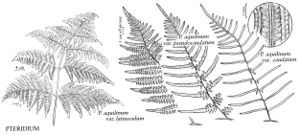Difference between revisions of "Pteridium aquilinum var. latiusculum"
Cat. N. Amer. Pl. ed. 3 17. 1909.
imported>Volume Importer |
imported>Volume Importer |
||
| Line 59: | Line 59: | ||
|publication year=1909 | |publication year=1909 | ||
|special status=Illustrated | |special status=Illustrated | ||
| − | |source xml=https:// | + | |source xml=https://bitbucket.org/aafc-mbb/fna-data-curation/src/2e0870ddd59836b60bcf96646a41e87ea5a5943a/coarse_grained_fna_xml/V2/V2_371.xml |
|genus=Pteridium | |genus=Pteridium | ||
|species=Pteridium aquilinum | |species=Pteridium aquilinum | ||
Latest revision as of 20:23, 5 November 2020
Petiole 15–100 cm. Blade broadly triangular to sometimes ovate, 3-pinnate or 3-pinnate-pinnatifid at base, 20–80 × 25–50 cm; blade margins and abaxial surface shaggy, rachises and costae glabrous or sparsely pilose abaxially. Pinnae (proximal) broadly triangular, distal pinnae narrowly triangular or oblong; terminal segment of each pinna ca. 2–4 times longer than wide, longer ultimate segments less than their width apart, ca. 3–6 mm wide. Pinnules at 45°–60° angle to costa; fertile ultimate segments adnate or equally decurrent and surcurrent. Outer indusia entire or somewhat erose, glabrous. 2n = 104.
Habitat: In barrens, pastures, open woodlands in moderately to strong acid soil, abundant, forming large colonies
Elevation: 0–1500 m
Distribution

St. Pierre and Miquelon, Alta., B.C., Man., N.B., Nfld. and Labr. (Nfld.), N.S., P.E.I., Ont., Que., Ala., Ark., Conn., Del., D.C., Fla., Ga., Ill., Ind., Iowa, Ky., La., Maine, Md., Mass., Mich., Minn., Miss., Mo., N.H., N.J., N.Y., N.C., N.Dak., Ohio, Pa., R.I., S.C., S.Dak., Tenn., Vt., Va., W.Va., Wis., Mexico in Nuevo León, Europe, Asia.
Discussion
Colonies are more frequent in the northern part of the range. Fertile colonies, however, are more frequent in the southern and eastern portion of the range. Outliers in British Columbia and Alberta, which we have not seen, are documented in W. J. Cody and D. M. Britton (1989).
Selected References
None.
